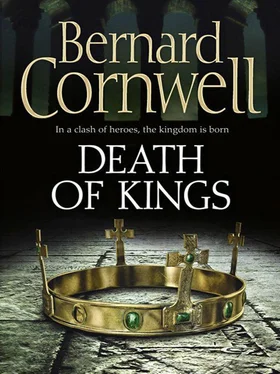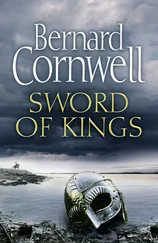‘Follow the Roman road,’ he said, pointing.
‘Follow the Roman road, lord,’ I said.
He hesitated, plainly wanting to defy me, but good sense won. ‘Yes, lord,’ he said.
‘And tell me a good defensive place a day’s ride away.’
He shrugged. ‘You can try Scrobbesburh, lord?’
‘Rouse the fyrd,’ I told him, ‘and make sure the walls are manned.’
‘I know my duty, lord,’ he said, yet it was plain from his truculence that he had no intention of reinforcing the men who lazed on the ramparts. That empty, innocent sky persuaded him that there was no danger, and doubtless the moment I left he sent a messenger to Æthelred saying I was panicking unnecessarily.
And perhaps I was panicking. The only evidence of war was the slaughter at Turcandene and the sixth sense of a warrior. War had to come, it had been hiding away for too long, and I was convinced the raid that had killed Ludda was the first spark of a great fire.
We rode on north, following the Roman road that led through the valley of the Sæfern. I missed Ludda and his astonishing knowledge of Britain’s pathways. We had to ask our way, and most folk we questioned could only give us guidance to the next village or town. Scrobbesburh lay to the west of what seemed the quickest way north and so I did not go there, instead we spent a night amidst towering Roman ruins at a place called Rochecestre, a village that astonished me. It had been a vast Roman town, almost as large as Lundene, but now it was a ruin of ghosts, crumbling walls, broken pavements, fallen pillars and shattered marble. A few folk lived there, their wattle and straw huts propped against the Roman stone and their sheep and goats grazing amidst the broken glory. A scrawny priest was the only man who made sense, and he nodded dumbly when I told him I feared the Danes were coming. ‘Where would you go if they came?’ I asked him.
‘I’d go to Scrobbesburh, lord.’
‘Then go there now,’ I ordered him, ‘and tell the rest of the village to go. Is there a garrison there?’
‘Just whoever lives there, lord. There’s no thegn. The Welsh killed the last one.’
‘And if I want to reach Ceaster from here? What road do I take?’
‘Don’t know, lord.’
Places like Rochecestre fill me with despair. I love to build, yet I look at what the Romans did and know we cannot construct anything half so beautiful. We build sturdy halls of oak, we make stone walls, we bring masons from Frankia who raise churches or feast-halls with crude pillars of ill-dressed stone, yet the Romans built like gods. All across Britain their houses, bridges, halls and temples still stand, and they were made hundreds of years ago! Their roofs have fallen and the plaster is flaked, but still they stand, and I wonder how people who were able to make such marvels could have been defeated. The Christians tell us we move inexorably towards better times, towards their god’s kingdom on earth, but my gods only promise the chaos of the world’s ending, and a man only has to look around him to see that everything is crumbling, decaying, proof that the chaos is coming. We are not climbing Jacob’s ladder to some heavenly perfection, but stumbling downhill towards Ragnarok.
The next day brought heavier clouds that shadowed the land as we climbed the small hills and left the Sæfern’s valley behind. If there was smoke we saw none except the tendrils from cooking fires in small villages. Off to our west the peaks of the Welsh hills vanished in the clouds. If there had been an attack, I thought, we would surely have heard by now. We would have met messengers riding away from the carnage or refugees fleeing the invaders. Instead we rode through peaceful villages, past fields where the first harvesters swung their sickles, and always following the Roman road with its mile-marked stones. The land sloped down to the north now, towards the Dee. It began to rain as the day wore on and we found shelter that evening in a hall close to the road. The hall was a poor place, its oak walls scorched by a fire that had evidently failed to burn the place down. ‘They tried,’ the owner, a widow whose husband had been killed by Haesten’s men, told us, ‘but God sent rain and they failed. Didn’t keep me from harm, though.’ The Danes, she said, were never far away. ‘And if it’s not the Danes it’s the Welsh,’ she said bitterly.
‘Then why stay here?’ Finan asked her.
‘And where do I go? I’ve lived here more than forty years, so where do I start again? You’ll buy this land from me?’
Rain dripped through the thatch all night, but the dawn brought a chill clearing wind. We were hungry because the widow could not spare food for all my men, not unless she killed the cockerels that were crowing and the pigs that were being driven to the nearby beech wood as we threw saddles over our horses’ backs. Oswi, my servant, was tightening my stallion’s girth strap as I wandered to the ditch on the north side of the hall. I gazed ahead as I pissed. The clouds were low and dark, but was there a darker smudge there? ‘Finan,’ I called, ‘is that smoke?’
‘God knows, lord. Let’s hope so.’
I laughed. ‘Hope so?’
‘If peace lasts much longer I’ll go mad.’
‘If it lasts into the autumn we’ll go to Ireland,’ I promised him, ‘and break some of your enemies’ heads.’
‘Not to Bebbanburg?’ he asked.
‘I need at least a thousand more men for that, and to get a thousand men I need the profits of a war.’
‘We all suffer from dreams,’ he said wistfully. He stared northwards. ‘I’m thinking that is smoke, lord.’ He frowned. ‘Or maybe just a thundercloud.’
And then the horsemen came.
There were three of them, riding hard from the north and when they saw us they slewed off the road and spurred their mud-spattered, tired horses towards the hall. They were Merewalh’s men, sent south to warn Æthelred that the Danes had attacked. ‘Thousands of them, lord,’ one told me excitedly.
‘Thousands?’
‘Couldn’t count them, lord.’
‘Where are they?’
‘Westune, lord.’
The name meant nothing to me. ‘Where’s that?’
‘Not far.’
‘Two hours’ ride, lord,’ another man said more helpfully.
‘And Merewalh?’
‘Retreating, lord.’
They told me the message Merewalh was sending to Æthelred, which was simply that an army of Danes had streamed out of Ceaster, far too many for Merewalh’s small force to contain or even face. The Danes were coming south, and Merewalh, remembering the tactics I had used against Sigurd, was retreating down the Welsh border in hopes that the savage tribesmen would come from the hills to attack the invaders. ‘When did they attack?’ I asked.
‘Last night, lord. At twilight.’
A strange time, I thought, yet on the other hand it had probably been intended to take Merewalh’s force off-guard, and if so it had failed. Merewalh had been alert, his scouts had warned him, and so far he had escaped. ‘How many men does he have now?’ I asked.
‘Eighty-three, lord.’
‘And who’s leading the Danes? What banners did you see?’
‘A raven, lord, another with an axe breaking a cross, and a skull.’
‘There were dragons as well,’ the second man put in.
‘And two with wolves,’ the third man added.
‘And a stag with crosses on its head,’ the first man said. He struck me as intelligent and thoughtful, and he had told me what I needed to know. ‘A flying raven?’ I asked him.
‘Yes, lord.’
‘That’s Sigurd,’ I said, ‘the axe is Cnut and the skull is Haesten.’
‘And the stag, lord?’ he asked.
‘Æthelwold,’ I said bitterly. So it seemed Offa had been right and the Danes were attacking from Ceaster, and that surely meant they were heading southwards, ostensibly led by Æthelwold. I gazed northwards, thinking that the Danes could not be far away. ‘Lord Æthelred,’ I spoke to the first man, ‘will probably send you to King Edward.’
Читать дальше
Конец ознакомительного отрывка
Купить книгу












